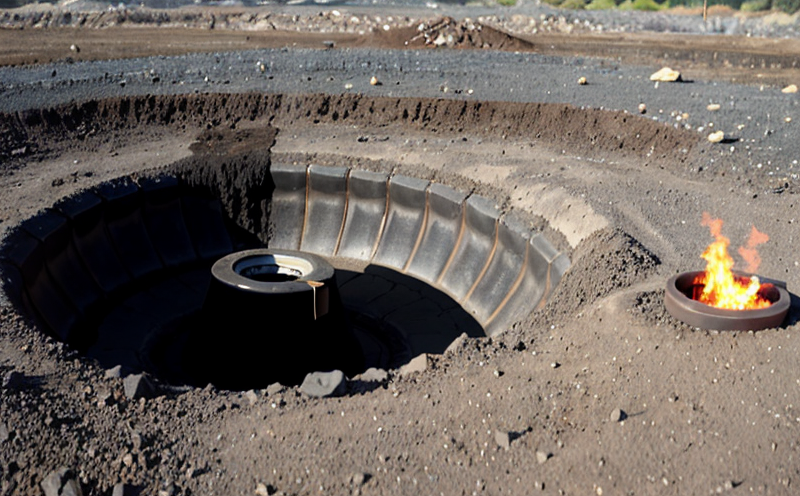ISO 12902 Trace Elements in Coal Testing
The ISO 12902 standard is specifically designed to determine the trace elements present in coal and fossil fuels. This service ensures that mining companies, quality managers, compliance officers, and R&D engineers can accurately measure and report on the levels of critical trace elements such as arsenic (As), cadmium (Cd), chromium (Cr), copper (Cu), iron (Fe), lead (Pb), manganese (Mn), nickel (Ni), selenium (Se), vanadium (V), and zinc (Zn).
The importance of this testing cannot be overstated. Trace elements play a crucial role in the environmental impact assessment, health and safety regulations, and quality control for coal products. Understanding these trace element concentrations helps in ensuring compliance with international standards and guidelines such as ISO 12902:2018.
The analysis involves several steps including sample preparation, digestion, and instrumental determination using techniques like Inductively Coupled Plasma Mass Spectrometry (ICP-MS) or Flame Atomic Absorption Spectrophotometry (FAAS). The precision and accuracy of these methods ensure reliable data that can be used for quality assurance and risk management.
The results from this testing are essential for various stakeholders. For mining companies, it helps in optimizing extraction processes and managing waste disposal responsibly. Quality managers use the findings to maintain product consistency and meet customer expectations. Compliance officers rely on the test outcomes to ensure adherence to regulatory frameworks such as those set by the European Union or U.S. Environmental Protection Agency (EPA).
R&D engineers can leverage these data points to innovate new technologies that reduce harmful emissions during coal processing. Procurement teams benefit from knowing which suppliers meet stringent quality standards, thus ensuring consistent supply chain performance.
Scope and Methodology
| Test Parameters | Description |
|---|---|
| Sample Preparation | The coal sample is crushed to a fine powder, typically passing through a 100-mesh sieve. This ensures uniformity and minimizes the risk of contamination during subsequent steps. |
| Digestion | A mixture of concentrated acids (usually nitric acid) is added to the sample in a microwave digestion system. The temperature and time are carefully controlled to ensure complete dissolution without loss of volatile elements. |
| Instrumental Determination | This involves using ICP-MS or FAAS, which provide precise quantification of trace elements down to parts per million (ppm) levels. |
| Acceptance Criteria | Description |
|---|---|
| Copper (Cu) | Maximum limit: 100 ppm. Exceeding this can lead to respiratory issues if inhaled. |
| Zinc (Zn) | Maximum limit: 50 ppm. High concentrations may cause metal toxicity. |
| Selenium (Se) | Maximum limit: 10 ppm. Essential for some organisms but toxic at higher levels. |
| Cadmium (Cd) | Maximum limit: 1 ppm. A major environmental pollutant and carcinogen. |
Eurolab Advantages
Eurolab offers unparalleled expertise in coal testing, with a team of experienced chemists and engineers who are well-versed in the nuances of ISO 12902. Our state-of-the-art facilities equipped with advanced instrumentation ensure accurate and reliable results.
- Accurate and precise trace element analysis using ICP-MS and FAAS.
- Comprehensive quality assurance programs that meet or exceed international standards.
- Quick turnaround times for urgent testing needs, ensuring minimal disruption to your operations.
- Expert interpretation of results with actionable insights tailored to your specific requirements.
We also provide detailed reports that are not only compliant with ISO 12902 but also easy to understand and implement. Our commitment to excellence is reflected in our consistent performance, which has earned us a reputation as a leading laboratory in the mining industry.
Why Choose This Test
- Regulatory Compliance: Ensures adherence to international standards and local regulations.
- Health & Safety: Identifies potential health risks associated with elevated levels of trace elements.
- Environmental Impact: Helps in managing environmental emissions by providing accurate data on trace element content.
- Quality Control: Guarantees consistent product quality across different batches and suppliers.
- Innovation Support: Provides valuable insights that can drive technological advancements within the industry.
- Supply Chain Assurance: Ensures that all parties involved in coal procurement adhere to strict quality standards.
- Risk Management: Allows for proactive measures against potential risks posed by trace elements.
The ISO 12902 testing is a critical component of any comprehensive quality management system, providing the data necessary to make informed decisions about coal processing and utilization.





